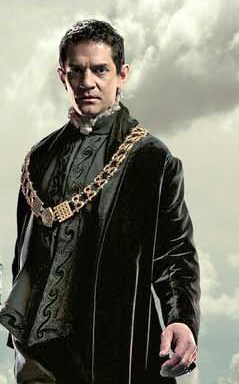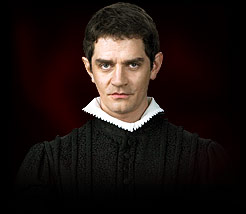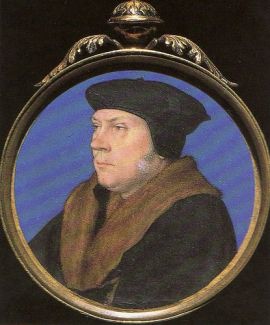Thomas Cromwell, Earl of Essex
Jump to navigation
Jump to search
| See also: The Tudors Cast | The Tudors Episode Guide | |
|
Thomas Cromwell, 1st Earl of Essex as played by James Frain
| Born c. 1485 - Executed July 28, 1540 by Order of King Henry VIII Character's Backstory: Born in Putney, London in 1485, the son of a brewer/blacksmith who was known for illegal and drunken behavior. Over the course of several years, Thomas was a soldier in the French army in Italy, a clerk in the Netherlands, and a lawyer in London. On his return to England he worked as a lawyer before joining the service of Thomas Wolsey. In 1523, Cromwell was elected to the House of Commons; two years later he helped Wolsey dissolve some small monasteries. When Wolsey fell from grace in 1529, Cromwell was hurriedly elected burgess for Taunton so he could remain in government service. There were striking similarities between the two men - both managed to remain favorites of the mercurial Henry VIII for years; both were despised by the older nobility who coveted their influence with the king; both sought to reform the creaky medieval bureaucracy of Tudor government; both were highly intelligent and well-versed in international affairs. And both, ultimately, fell from Henry's favor with spectacular speed. In the end, the king preferred to listen to the old nobility. But Cromwell and Wolsey were also markedly different in many ways. Cromwell was the architect of the Henrician Reformation, while Wolsey fell because he served two masters--the king of England and the Pope. After the death of Jane Seymour, Cromwell arranged for Henry's marriage to Anne of Cleves, a move that joined England with the German Protestant states. The marriage was a failure, and Cromwell's enemies used Henry's displeasure with Cromwell to their advantage. Thomas Cromwell was eventually beheaded for heresy on the day that Henry married Katherine Howard. Gentility: Born a 'commoner.' Evidently a self-made lawyer. Position: Member of English Parliament, Henry VIII's chief minister, Master of the Jewel House, Earl of Essex. His career progressed as follows: 1531 - Member of the Privy Council 1532 - Master of Court of Wards and Master of Jewel House 1533 - Chancellor of the Exchequer 1534 - King's Secretary and Master of the Rolls 1535 - Vicar-General 1536 - Lord Privy Seal and Baron Cromwell of Oakham 1537 - Knight of the Garter and Dean of Wells 1539 - Lord Great Chamberlain 1540 - Created Earl of Essex (and many more titles too numerous to name) Personality Type: Ruthless and ambitious. Methodical, detached and calculating. Henry VIII called him a "good household manager" and his "most faithful servant." He was an opportunist who disliked papal authority. "the Lord Privy Seal was the whipping-boy for everyone who disliked his prince's doings. He was detested as a social climber, as a Protestant, as the scourge of the great abbeys and monasteries, and, above all, as a successful politician who controlled the good things of political life. Though Cromwell more often than not spoke for his master and not himself, he alone won the hatred inspired by Henry's rough and tactless policies." ~Lacey Baldwin Smith Signature Look: Dour and clerical. Endearing Traits: Effective and efficient in government. He was a kind master, and a staunch friend; and he possessed all the outward graces of the Renaissance period. He was not vindictive, and his atrocious acts were done in no private quarrel, but in what he conceived to be the interests of his master and the state. Where those interests were concerned he had no heart, no conscience and no religious faith; no man was more completely blighted by the 16th century worship of the state. Annoying Traits: Motivated by financial gain. Does whatever will get him ahead, no matter who he has to pull down or kill to get there.
| "No Lord or gentleman in England bears love or favour to my Lord Privy Seal (Cromwell) because he is a great taker of money. He will speak, solicit or do for no man but all for money" - George Paulet 1538 "Cromwell is constantly rising in power, so much that he has now more influence with his master than Cardinal [Wolsey] ever had. Nowadays, everything is done at his bidding" - Ambassador Chapuys to Charles V 1535 "Most gracious prince I cry for Mercy, Mercy, Mercy" ~ Cromwell to Henry from the Tower of London
| |||||
CHARACTER CONNECTIONSFamily Members: Father: Walter Cromwell Mother: Katherine Glossop (Also known as Clossop) Marriage: Elizabeth Wykes (1489–1527) May have died from sweating sickness. Children: Gregory Cromwell, 1st Baron Cromwell. Was married to Elizabeth Seymour (Jane Seymour's sister). Elizabeth Seymour Cromwell served as a maid of honor to Anne Boleyn., then became Chief Lady in Waiting to her own sister Jane. Elizabeth Cromwell also later served as a Lady in Waiting to Katherine Parr, who married Elizabeth's brother Thomas Seymour after Henry VIII's death. Anne Cromwell. Died young, possibly from sweating sickness. Grace Cromwell: Died young, possibly from sweating sickness. Other Relatives: Nephews: Sir Richard (Cromwell) Williams, Christopher Wellyfed Niece: Alice Wellyfed Sister-in-Law: Joan Williamson Mother-in-Law: Mercy Prior Grandchildren: Henry (*1538), Frances (*1544), Catherine, Edward, Thomas (*1552) HISTORICAL CONNECTIONS The Lord Protector of England, Oliver Cromwell (1599-1658), was descended from Thomas Cromwell's sister, Catherine Cromwell. Making Thomas Cromwell, Oliver Cromwell's great-great uncle. | Friends: Thomas Wolsey, who (in a way) helped him gain his position as chief adviser to Henry VIII. The Boleyns - until he switched sides in the coup to bring them down Thomas Cranmer Thomas Wyatt (in reality) Richard Rich (in the series but not in reality) Charles Brandon (in reality, not in the series) Enemies: Bishop Stephen Gardiner, Bishop of Winchester William Brereton (in reality) Thomas Howard, 3rd Duke of Norfolk (in reality) Charles Brandon, 1st Duke of Suffolk (in the series but not in reality) Sir Thomas More Reginald Pole The Catholic Faction Francis Bryan Edward Seymour |
UNFORGETTABLE CHARACTER QUOTES
|
DEFINING EPISODES | MEMORABLE SCENES
LINKS To view/add more information on Thomas Cromwell click here :
|
PHOTOS
<embed flashvars="transition=Fade&site=http://www.thetudorswiki.com&imageServer=http://image.wikifoundry.com&albumId=42026" height="400" src="http://widget.wetpaintserv.us/wiki/thetudorswiki/widget/unknown/ad19393053f516917c0199c65c660f63b35c8ce2" type="application/x-shockwave-flash" width="400" wmode="transparent"/> |
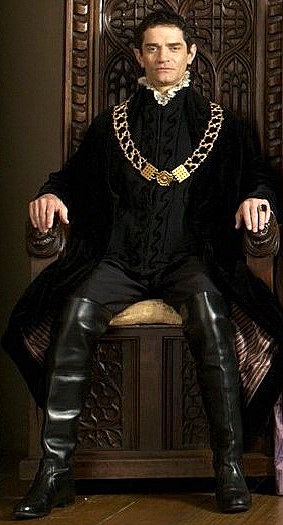 | 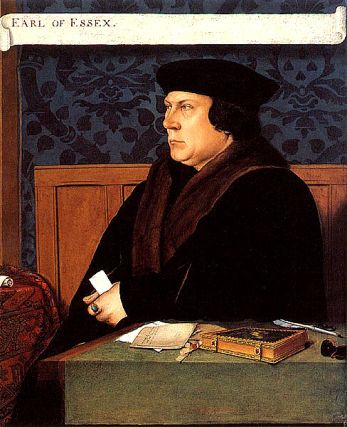 Thomas Cromwell, Earl of Essex Portrait by Hans Holbein the Younger |
<embed align="bottom" allowfullscreen="true" height="465" src="http://widget.wetpaintserv.us/wiki/thetudorswiki/widget/youtubevideo/b43e3a46b225a500e282a82a5490cf323bf2a6cf" type="application/x-shockwave-flash" width="566" wmode="transparent"/> |
| See also: The Tudors Cast | The Tudors Episode Guide | |
|
